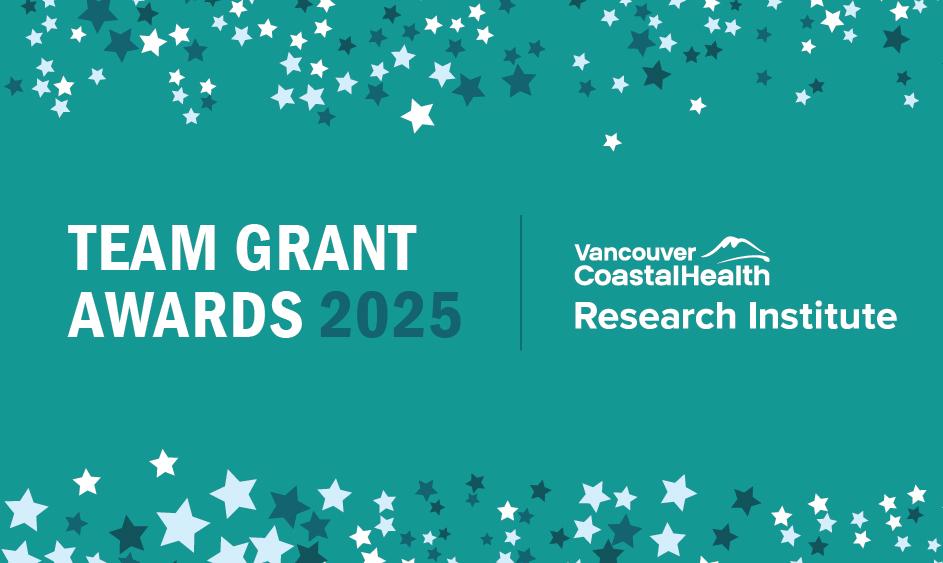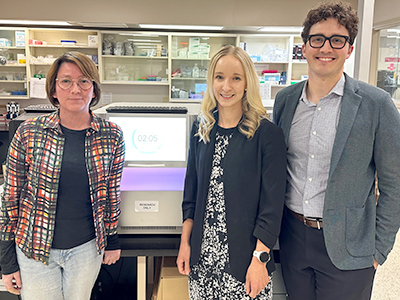
Congratulations to this year's recipients of the Vancouver Coastal Health Research Institute Team Grant Awards!
Vancouver Coastal Health Research Institute (VCHRI) is proud to support research through Team Grant projects, which enable VCH staff and clinicians to collaborate with experienced investigators to share knowledge and build connections. By supporting practice-based research projects, these grants contribute to the improvement of health care delivery addressing the pressing challenges in health care.
The 2025 VCHRI Team Grant recipients are:
- Amanda Driver, clinical pharmacy specialist at Vancouver General Hospital (VGH) and clinical instructor in the Faculty of Pharmaceutical Sciences at the University of British Columbia (UBC)
- Dr. Lindsay Mackay, medical coordinator at the Downtown Eastside Connections Clinic and clinical instructor in the Department of Family Practice at UBC
- Dr. Iain McCormick, physician lead for the Hospital at Home program at VGH and clinical assistant professor in the Division of General Internal Medicine at UBC
Increasing lung transplant opportunities for sensitized patients

Project title: Retrospective cross-sectional evaluation of clinical and immunologic outcomes in lung transplant recipients between 2014 and 2022
Lung transplantation is an effective treatment option for patients with end-stage lung disease, but the demand for donor organs exceeds supply. For patients with heightened immune system reactivity, also known as alloreactivity, the challenge is even greater. These patients face higher risks of transplant rejection, leading to longer wait times, decreased quality of life and increased waitlist mortality.
At VGH, peri-operative desensitization has been the standard of care for patients with pre-existing alloreactivity for the past decade. This approach combines medication and antibody removal techniques to mitigate the risk of donor tissue rejection.

“Patients with alloreactivity often experience longer waitlist times and lower rates of transplantation compared to other recipients,” says Driver. “By evaluating the effectiveness and safety of desensitization protocols, we hope to increase access to transplantation for this vulnerable group.”
Exploring a low barrier, peer-led contingency management program for people who use opioids and stimulants

Project title: Evaluating peer-supported contingency management for opioid and stimulant use disorders: A feasibility and acceptability study
Unregulated opioids and stimulants continue to drive record overdose deaths in Vancouver’s Downtown Eastside (DTES). People who struggle with both opioid and stimulant use disorders face significantly higher risk of toxic drug poisonings, relapse and treatment dropout, yet few interventions are designed that target both conditions.
This study will evaluate the feasibility and acceptability of a 12-week, peer-led, low barrier contingency management (CM) intervention at DTES Connections Clinic. CM uses immediate, tangible rewards to reinforce positive behaviours such as medication adherence, attendance and goal achievement. This project utilizes a low-barrier, peer-partnership model in which every participant works one-on-one with a trained peer who has lived substance use experience. Peers co-design the reward structure and treatment protocol and will guide participants in setting individualized goals, ensuring the program remains safe. Findings will inform the scale-up of peer-led CM across other low-barrier clinics and harm-reduction settings, with the long-term goal of reducing toxic drug deaths and improving well-being for people who use drugs in the DTES and beyond.

“Traditional contingency management programs are often delivered in structured treatment settings and focus on abstinence. Ours, by design, is low barrier and centres on each participant’s own priorities, supporting individualized goals that range from harm-reduction steps to abstinence,” says Mackay. “By having peers lead the program, we aim to build a program that participants trust and want to return to, ultimately improving health and social outcomes for populations at some of the highest risk of toxic drug poisoning and related harms.”
Evaluating a program that brings hospital-level care to patients in their own homes

Project title: Evaluation of Vancouver General’s Hospital at Home program
Hospital overcrowding is a pressing issue in Canadian health care that leads to reduced quality of care and stressful experiences for both patients and providers. Hospital at Home (HaH) is a new program at VGH that provides hospital-level care for acute conditions in patients’ homes, offering a safe and effective alternative to traditional hospitalization. This program has the potential to reduce the burden on hospitals while maintaining high-quality care.
Since its launch in January 2024, the HaH program at VGH has not yet been formally evaluated. This research aims to compare the HaH program to standard inpatient care at VGH and explore the experiences of patients and caregivers involved with the program. To achieve this, they will analyze health data to compare outcomes including hospital readmissions and length of stay between HaH and inpatient care. Additionally, they will conduct surveys to gather feedback on patient and caregiver experiences with HaH.

“Hospital at Home is still in its early stages at VGH, and as such, assessing its impact is essential for guiding quality improvement and future expansion,” says McCormick. “Our evaluation will ensure the program remains safe, effective and responsive to the needs of patients and families,” adds Dr. Kristy Wang, General Internal Medicine fellow and co-investigator.
Team Grants are made possible with the generous support of the VGH & UBC Hospital Foundation and the Organ Donation and Transplant Research Foundation of BC, in partnership with VCHRI.


